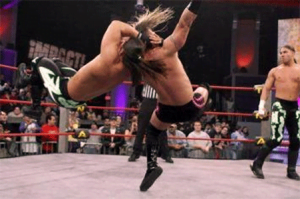The Trivialisation of the Neckbreaker, Awesome and SEO Tactics

Why am I telling you this? Simply put, it struck a chord with me.
I watched a few matches and I saw something that made me think about work (few things don’t, these days) and even the evolution of language.
During the 80’s and 90’s, there was a wrestler called Ravishing Rick Rude. He was a WWE (WWF back then) mainstay and his finishing maneuver was a showy variation of the neckbreaker; a move where he drove his shoulder straight into the back of the neck of his opponent. Have a look at one below (sorry for the video game footage, I couldn’t find a better example).
Obviously he wasn’t really doing that – the unhappy recipient would be dead or at least crippled for life, but I digress. His delivery of the move was considered devastating enough that it would keep all but the toughest opponent in a main event on the mat for the count of three after it was delivered. It was a “finishing move”, a final solution, an absolute in the game of professional wrestling.
The other night, pretty much every match I watched featured a neckbreaker and the finishing moves were some of the most gravity-defying feats of gymnastics I’ve ever seen a perma-tanned shiny giant perform. The game has changed. What was “devastating” a frightening number of years ago was now commonplace, even lazy. It was a placeholder, allowing the participants to catch their breath, good enough to take a rest, but not enough to hold anyone down for a three-count.
It’s much like how we say everything is “Awesome” now. We’ve taken it on to such a degree that it means “pretty cool”, or even “not bad” rather than “inspiring awe”. We’ve got to the point that when something actually is good, some people will actually use the phrase “super awesome”. It’s become the neckbreaker of the English language.
We always seem to have to take things further. To use what works to such an extent that it becomes the standard rather than above and beyond. That’s not necessarily a bad thing, but it did get me thinking about how it applies to SEO.
The Evolution and Abuse of SEO Tactics
Everything has to evolve, including SEO tactics – at least it does if you want to keep pushing things further and not just rely on short term wins.
I’ve alluded to this in my Link Economy and More Trap posts: search engines, and search engine optimisation, are like everything else – they evolve. Some things will never change. You’ll always have to have the basics in place, like the collar and elbow tie-up or a bodyslam or decent redirects, but things that used to be a sure-fire winner have got to move on.
I remember when a certain type of link (deliberately obfuscated – no outing here) first showed up. At first, they were a cheeky little secret amongst the “elite”, at least they were in the circles I moved in back then. They let them get results that those outside the inner cohort couldn’t. It let them stay on top for a while. It was the finishing move of the time; it was better than directories, it was more effective than articles, it was less expensive than other types of paid link, it was a hell of a lot easier than doing things the hard way and, most importantly, it worked.
Then, over the course of a couple of years, they became the neckbreaker. They started to be used by everyone, they stopped being the finishing move, the icing on the cake, they became commonplace, to the point that Google noticed and stopped a lot of them working. These links became something that you could use, but things would go right back to normal almost straight after, if they worked at all, and they opened you up to a counterattack that could be devastating.
Things moved on. They always do. The opponent will become more resilient, the competition tougher, you will have to work harder, but having the most solid foundation in the basics will always let you adapt.
The high-flyers, the risk takers, they’re thrilling for a while, but they’re taken out of the game earlier than ever with knee or neck injuries, with broken bodies that belie their years. Those who can make a great match based upon being engaging, exciting, but sticking to what matters? They’re the stars that you’ll watch into their old age. They’re the people who will get the results, the decorations, the legacies, in wrestling and also in online marketing.
The Hard Way or The Flashy Way?
I’m not saying for a second that doing things the hard way doesn’t take its toll; it does. My current physical situation will tell you that – the RSI-riddled hands and shoulders from typing, the three keyboards a year from battering out thousands of words per day and night will wear you down, no matter who you are.
I’m also not saying I’ve always been so deep into playing by the rules – I really haven’t been. I’ve done things for links over the years that I’m really not proud of, but I suppose that’s my point.
When you’ve taken your risks and realised that the only way you’re going to last is to stick to the longer game, you can realise that you can still win. You can still have your devastating finisher, it’s just that it’s got to be one that’s grounded in the basics but with some extra effort somewhere along the line. The match has to be based around the things that will always work rather than trying to run it on high-flying techniques that will destroy you sooner than you think. It’s got to be about avoiding shortcuts and just putting the work in. At least that’s my take on things.
How about you? Do you still want to fly high for a short amount of time or are you in this for the long game? I know I always say this, but I’d love to hear what you think.




